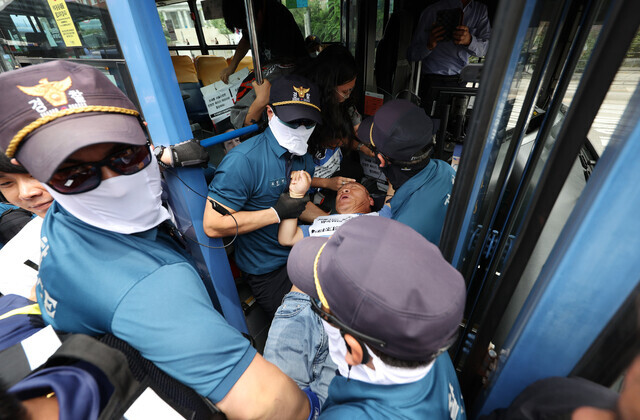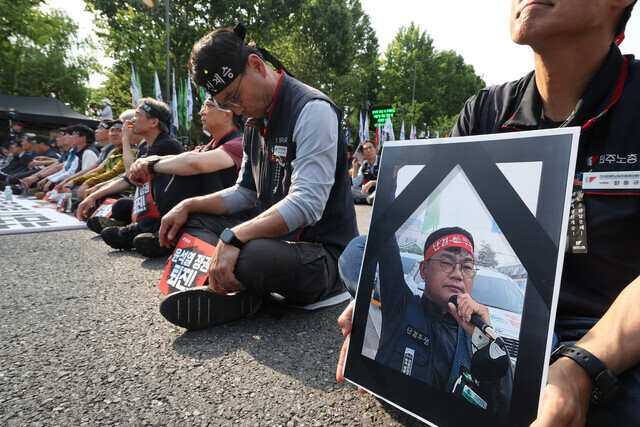hankyoreh
Links to other country sites 다른 나라 사이트 링크
Amnesty notes ‘erosion’ of freedom of expression in Korea in annual human rights report

Amnesty International noted the continuous “erosion of rights to freedom of expression” in South Korea in its annual human rights report, released Wednesday.
This week, Amnesty International released its “State of the World’s Human Rights” report, which examines the human rights situation in 155 countries. In the report, the group expressed concern over the state of human rights in general in South Korea. Each year, the group issues this comprehensive report that examines and analyzes the state of human rights at global, regional and national levels.
Amnesty International picked freedom of expression, workers’ rights, and the right to a healthy environment as factors of major concern in the country.
“The erosion of rights to freedom of expression, association and assembly continued against a backdrop of a government clampdown on ‘illegal’ protests,” the report noted, mentioning transport company Seoul Metro’s suit against the disability advocacy group Solidarity Against Disability Discrimination in January 2023, in which Seoul Metro claimed 600 million won (US$4359,00) in damages.
The report also mentioned how “harassment of labour activists intensified in the context of President Yoon [Suk-yeol]’s anti-union rhetoric,” while referencing Korean Construction Workers Union executive Yang Hoe-dong’s self-immolation. Yang protested the government’s heavy-handed investigations into construction labor unions, which the government likened to “thugs,” by setting himself on fire outside of the Gangneung branch of the Chuncheon District Court on May Day of 2023. Police then forcibly tore down the public memorial space installed to commemorate Yang and raided the KCWU’s office.

Amnesty also assessed South Korea’s plans to fight global warming to be well below expectations. Kim Ji-hak, the director of Amnesty International’s South Korea branch, said, “The government adopted the National Basic Plan for Carbon Neutrality and Green Growth, which promises to lower greenhouse gas emissions in the industrial sector without passing legislation to phase out coal in energy production. Since we are now facing a climate catastrophe, instead of a climate crisis, the government must prioritize the protection of human rights in its policies to address climate change.”
South Korea was not the only place where human rights were going downhill according to Amnesty. Agnès Callamard, the secretary general of Amnesty, cited the Israel-Hamas conflict and the Russian-Ukrainian war when stating, “States and armed groups frequently perpetrated unlawful attacks and killings in an increasing number of armed conflicts” and that the world is “hurtling backwards past the 1948 promise of universal human rights.”
“‘Authoritarian’ practices and ideas permeated many governments and societies. North to south, east to west, authoritarian policies ate away at freedoms of expression and association, hit out at gender equality, and eroded sexual and reproductive rights,” she also noted.
By Kim Chae-woon, staff reporter
Please direct questions or comments to [english@hani.co.kr]

Editorial・opinion
![[Editorial] Penalties for airing allegations against Korea’s first lady endanger free press [Editorial] Penalties for airing allegations against Korea’s first lady endanger free press](https://flexible.img.hani.co.kr/flexible/normal/500/300/imgdb/original/2024/0502/1817146398095106.jpg) [Editorial] Penalties for airing allegations against Korea’s first lady endanger free press
[Editorial] Penalties for airing allegations against Korea’s first lady endanger free press![[Editorial] Yoon must halt procurement of SM-3 interceptor missiles [Editorial] Yoon must halt procurement of SM-3 interceptor missiles](https://flexible.img.hani.co.kr/flexible/normal/500/300/imgdb/child/2024/0501/17145495551605_1717145495195344.jpg) [Editorial] Yoon must halt procurement of SM-3 interceptor missiles
[Editorial] Yoon must halt procurement of SM-3 interceptor missiles- [Guest essay] Maybe Korea’s rapid population decline is an opportunity, not a crisis
- [Column] Can Yoon steer diplomacy with Russia, China back on track?
- [Column] Season 2 of special prosecutor probe may be coming to Korea soon
- [Column] Park Geun-hye déjà vu in Yoon Suk-yeol
- [Editorial] New weight of N. Korea’s nuclear threats makes dialogue all the more urgent
- [Guest essay] The real reason Korea’s new right wants to dub Rhee a founding father
- [Column] ‘Choson’: Is it time we start referring to N. Korea in its own terms?
- [Editorial] Japan’s rewriting of history with Korea has gone too far
Most viewed articles
- 1[Editorial] Japan’s rewriting of history with Korea has gone too far
- 260% of young Koreans see no need to have kids after marriage
- 3Presidential office warns of veto in response to opposition passing special counsel probe act
- 4Vietnamese war victims speak of sexual violence by S. Korean troops for the first time
- 5Hybe-Ador dispute shines light on pervasive issues behind K-pop’s tidy facade
- 6For survivor, Jeju April 3 massacre is a living reality, not dead history
- 7[Column] Park Geun-hye déjà vu in Yoon Suk-yeol
- 8[Editorial] Penalties for airing allegations against Korea’s first lady endanger free press
- 9[Special Feature Series: April 3 Jeju Uprising, Part III] US culpability for the bloodshed on Jeju I
- 10[Column] America must frankly own up to role in tragic Jeju April 3 Incident